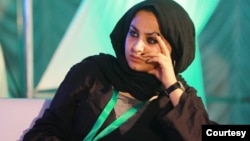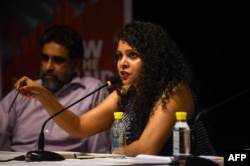"Canceled without prejudice." The large red stamp on the travel documents of Sanna Irshad Mattoo brought the photojournalist's plans grinding to a halt.
The Pulitzer Prize-winning journalist was due to travel to Paris for a book launch and the Arles Rencontres photography festival in France earlier this month.
She had a travel visa and plane tickets, but when Mattoo tried to board a flight in Delhi, immigration officials briefly detained the journalist, informing her she was barred from foreign travel.
No one, Mattoo said, has explained the reason for the ban.
"It is disappointing and disturbing not being able to attend the Arles Rencontres photo festival," Mattoo told VOA.
The festival has a special meaning for Mattoo. She was one of the 10 awardees of a Serendipity Arles grant in 2020.
Her work has also won international acclaim and she was part of the Reuters team honored with a 2022 Pulitzer for their coverage of the pandemic in India.
Legal and media analysts say travel bans like the one imposed on Mattoo contravene a constitutional right to travel and come amid a wider trend of harassment directed at critics.
At least four journalists from Indian-controlled Kashmir have been blocked from foreign travel since Delhi revoked the region's autonomous special status in August 2019. And journalists and rights advocates elsewhere in India, including investigative reporter Rana Ayyub and Aakar Patel, chair of Amnesty International in India, have also been blocked or delayed from travel.
In Ayyub's case, immigration officials at a Mumbai airport blocked the investigative journalist — known for her coverage of religious violence and extrajudicial killings — from boarding a flight to Britain on March 29, saying she was under investigation for money laundering.
Ayyub told the Committee to Protect Journalists at the time that she received a summons one hour before her scheduled departure. She was later able to travel.
While officials do not typically provide a reason for the ban, one Kashmiri journalist said officials cited unrest in the Indian-controlled region when he was stopped.
Gowhar Geelani, a freelancer who contributes to German outlet Deutsche Welle, was detained at an airport in New Delhi in 2019, while on his way to Bonn for media training.
In an account at the time, Geelani said immigration officials told him, "There is a lot of turmoil in Kashmir" and that they were just following orders.
An appeals process is available for those banned from travel.
Neither India's Bureau of Immigration nor its embassy in Washington responded to VOA's request for comment.
'Systematic harassment'
In a statement on Mattoo's case, the International Federation of Journalists described travel bans as "systematic harassment and a grave imposition on press freedom."
For Mattoo, the ban was a frustrating inconvenience.
"The Delhi airport immigration officers made me wait for more than two hours," Mattoo said. Then "officials told me that I couldn't board the flight."
But when the journalist asked why she was delayed, she says "officials stated that they were unsure of the reasons."
Umair N. Ronga, a lawyer at the Jammu and Kashmir High Court in Srinagar, told VOA that travel is a fundamental right in India.
"Restraining a person from traveling abroad and preventing a person from performing their professional duties amounts to a violation of a fundamental right," Ronga said, adding that such bans can be challenged under Article 226 of the Constitution.
Meenakshi Ganguly, South Asia director at Human Rights Watch, believes Indian authorities use travel bans to hide a poor human rights record.
A better approach, she said, would be for the government to focus on ending violations, including the targeting of minorities and Muslims, to preserve its reputation abroad.
International bodies including the United Nations and Human Rights Watch have called on the Indian government to take action to end the retaliatory attacks on Ayyub and others who investigate rights abuses.
HRW said in 2021 that authorities use "surveillance, politically motivated prosecutions, harassment, online trolling and tax raids" to target critics.
In an apparent response to claims India is backsliding on rights, Prime Minister Narendra Modi described the country as "the mother of democracy" at the G-7 summit in Germany last month.
"Government policies are systematically preventing independent reporting on events in Kashmir," Manoj Joshi, a fellow at the Observer Research Foundation, a think tank based in New Delhi, told VOA. "Journalists have been arrested, charged with sedition and prevented from doing their job."
India has dropped in the World Press Freedom Index. It currently ranks 150 out of 180 countries where 1 has the best climate for media, according to Reporters Without Borders.
The media watchdog said its findings show "press freedom is in crisis" across India and described the situation for journalists in Kashmir as particularly "worrisome."
For now, Mattoo is back in Srinagar, waiting to see if the ban will be lifted.
"I'm hoping that authorities will look into this matter at the earliest so that I can travel freely," she said.





